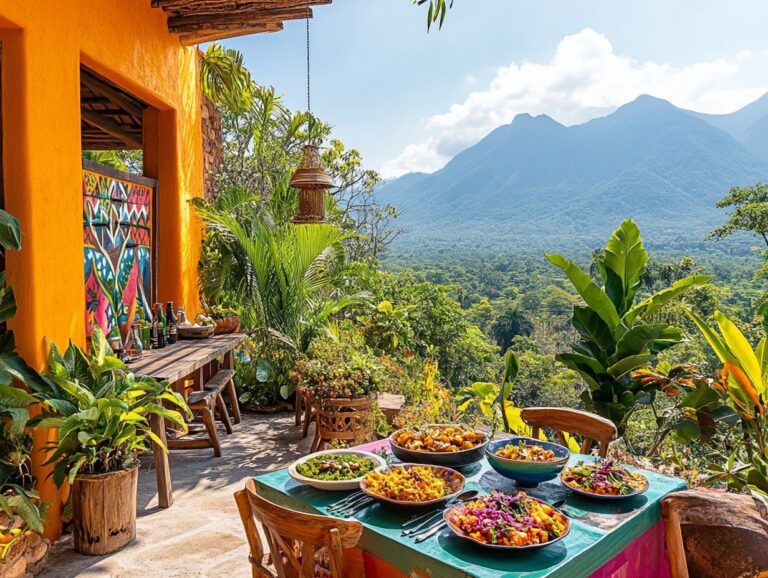Costa Rica has emerged as a popular destination for vegans among health-conscious tourists and eco-friendly travelers. The country offers a rich plant-based diet that is embraced by both locals and visitors. It features some of the best wellness experiences, ranging from participatory cooking classes to restorative yoga retreats. Embracing a vegan lifestyle in this beautiful environment can enhance well-being and contribute to sustainability. Discover all that veganism has to offer amidst the stunning landscapes of Costa Rica!
What is Veganism?
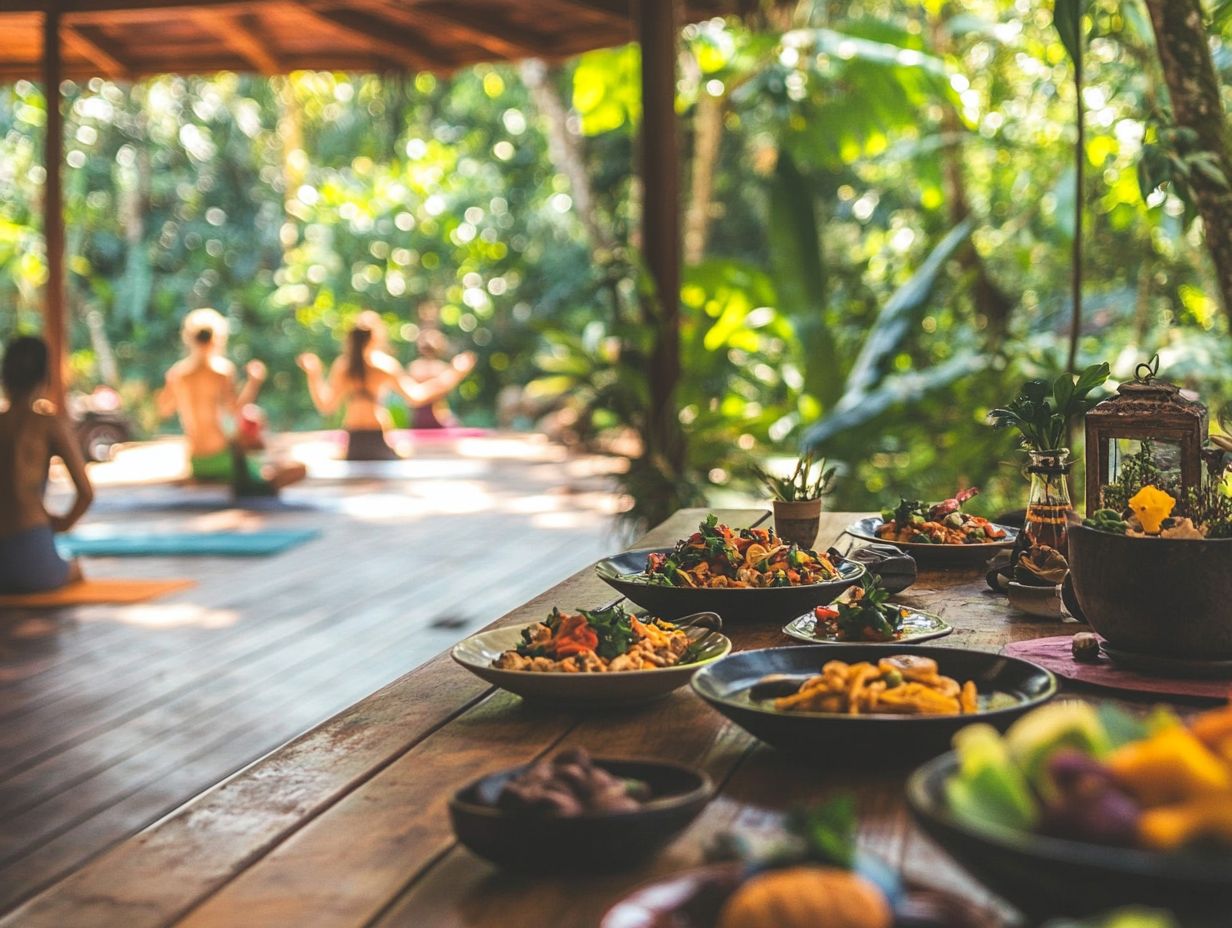
Veganism is both a lifestyle and dietary choice that involves abstaining from all animal products. It promotes a plant-based diet that emphasizes health, wellness, and sustainability.
This philosophy goes beyond food, reflecting a commitment to ethical living and a deep appreciation for the environment. Individuals who embrace veganism aim to reduce their ecological footprint while enhancing their overall well-being by focusing on plant-derived foods.
A typical vegan diet includes a variety of fruits, vegetables, grains, nuts, and seeds, all of which offer numerous health benefits and align with ethical practices concerning animals and the planet.
Why is Veganism Popular in Costa Rica?
Costa Rica’s rich biodiversity and emphasis on health and wellness are contributing to the growing popularity of veganism in the country. Its sustainability initiatives and abundance of local, organic produce have established Costa Rica as an ideal location for a healthy lifestyle that incorporates vegan practices.
The country’s food culture celebrates delicious plant-based ingredients, while eco-tours and wellness retreats foster a reconnection with nature and promote holistic living.
What is the Vegan Diet in Costa Rica Like?
The vegan diet in Costa Rica is characterized by an emphasis on fresh, local ingredients and diverse flavors, making it a vibrant aspect of the country’s culinary landscape.
Costa Rican veganism incorporates a wide variety of fruits, vegetables, grains, and legumes, often sourced from local farmers’ markets and organic farms.
The abundance of tropical fruits, combined with the cultural influence of traditional Costa Rican dishes, allows for the creation of nourishing vegan meals that prioritize health and sustainability.
Signature dishes like casado, which typically features rice and beans, can be easily adapted to be vegan by using plant-based proteins such as lentils or chickpeas, complemented by a colorful medley of sautéed vegetables.
Fresh fruits like mango, papaya, and guava serve as delightful snacks or ingredients in smoothies, showcasing the country’s commitment to organic produce.
Traditional snacks like patacones, made from ripe plantains, provide a satisfying option for those seeking a hearty plant-based meal.
By emphasizing local sourcing, this diet not only supports the community but also ensures that meals are rich in nutritional value, contributing to a holistic approach to health that is abundant in Costa Rica.
What are the Best Vegan Wellness Experiences in Costa Rica?
Costa Rica offers a variety of vegan wellness experiences for health-conscious travelers seeking to recharge and find inspiration in nature. These experiences include yoga retreats set in breathtaking natural surroundings and cooking classes that highlight local plant-based foods.
Such wellness activities allow guests to reconnect with the environment and often incorporate mindfulness practices, such as meditation. This approach fosters a holistic understanding of health that aligns closely with the principles of veganism.
1. Plant-Based Cooking Classes
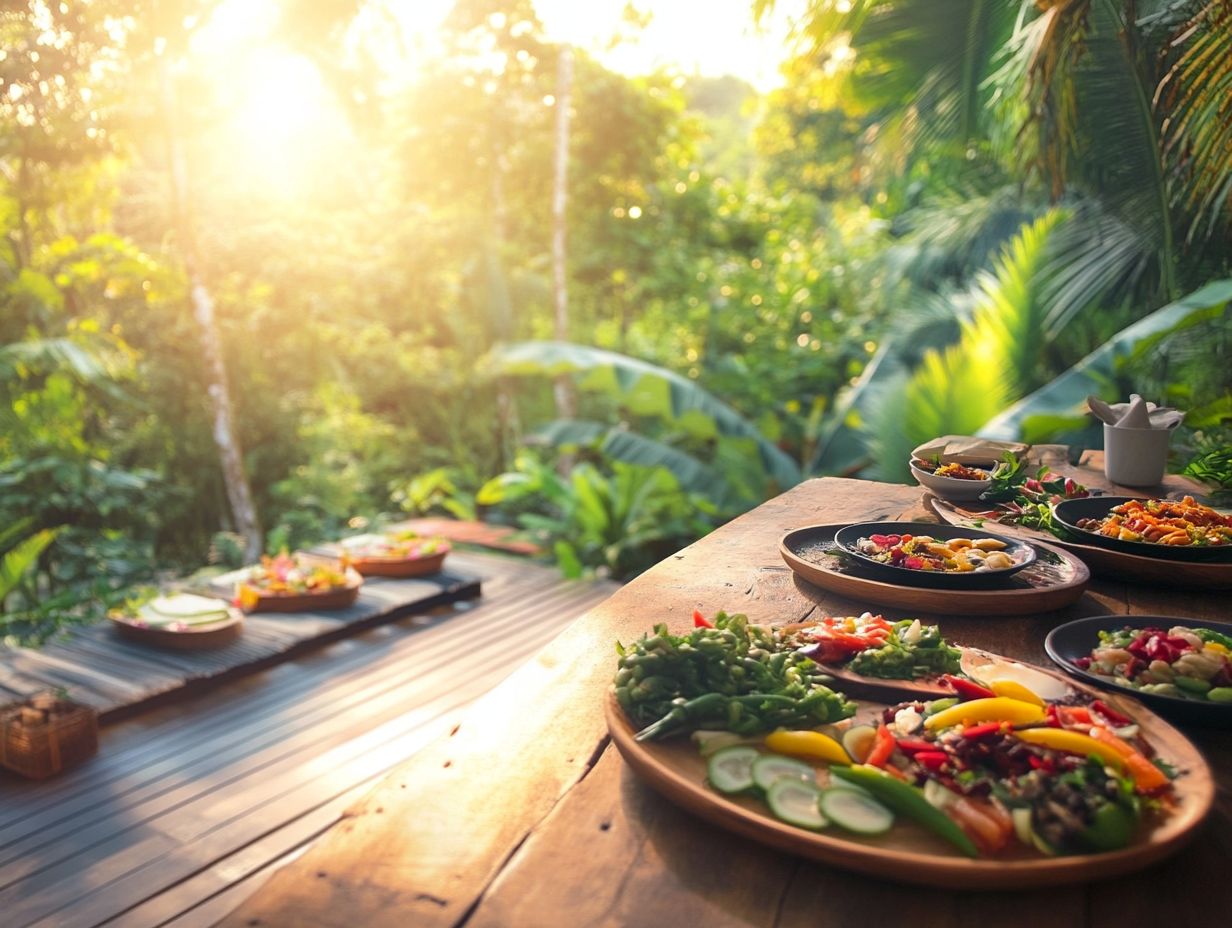
Plant-based cooking classes in Costa Rica offer a fantastic opportunity for individuals to learn how to prepare delicious vegan meals using fresh, local ingredients. These classes highlight the country’s rich agricultural diversity and promote a lifestyle centered around health and sustainability.
By focusing on organic, in-season produce, participants can maximize the potential of local Costa Rican ingredients while enhancing their cooking techniques. In these classes, attendees can expect to work with a wide array of local ingredients, such as:
- Plantains
- Beans
- Tropical fruits
Techniques such as grilling, steaming, and dehydrating enable participants to extract flavors and textures, resulting in delightful meals that showcase these ingredients. Additionally, culinary traditions from various cultures are often explored and connected to veganism.
By engaging in plant-based cooking, individuals can not only enhance their culinary skills but also contribute to a healthier planet by aligning their eating habits with sustainable practices and promoting overall health and wellness.
2. Yoga and Meditation Retreats
Many retreats in Costa Rica offer a nurturing setting where individuals can meditate and reconnect with nature. These experiences, set in pristine environments like the Nicoya Peninsula and Arenal Volcano, help participants unwind and recharge, promoting a renewed sense of well-being through daily yoga and meditation practices.
A focus on a vegan diet is common, featuring raw and detox meals that promote physical health and the mental clarity associated with mindfulness practice. These meals are prepared in eco-lodges like Farm of Life and Bodhi Tree Resort, where the purest air and water enhance the journey to wellness.
The retreats provide a wide variety of yoga styles, including Hatha, Vinyasa, and Kundalini, often held in tranquil settings like beaches in Tamarindo and Punta Islita, ensuring that there is something suitable for practitioners of all levels.
- Hatha
- Vinyasa
- Restorative
- Kundalini
ensuring that there is something suitable for practitioners of all levels. Experienced instructors with backgrounds in holistic health and wellness share their expertise, guiding participants through techniques that deepen both their physical and spiritual practices.
Additionally, the inclusion of mindfulness workshops and comprehensive holistic wellness programs enhances the overall approach to well-being, supported by the nurturing environment of eco-lodges like Mother Earth Vegan Hotel and Hotel Punta Islita.
The provision of fresh, organic, plant-based meals nourishes the body while reinforcing the retreat’s commitment to sustainable living, creating an ideal environment for those seeking transformation and rejuvenation.
3. Organic Farm Tours
Organic farm tours in Costa Rica, such as those at Finca Exotica and Tinamaste Farmers Market, provide an excellent opportunity to learn about sustainable agriculture and the production of local vegan foods.
During these tours, visitors can observe how sustainable practices are implemented, get an up-close look at organic produce, and understand the significance of eating locally sourced food.
The tours promote healthy eating choices while fostering a deeper appreciation for both the environment and local farmers. Participants have the chance to meet and learn directly from the farmers, gaining valuable insights into their practices and the challenges they encounter in organic farming.
In Costa Rica, organic produce ranges from traditional fruits and vegetables to a variety of herbs, spices, and even medicinal plants, available at places like the Nauyaca Waterfall area and Tinamaste Farmers Market.
Educational tours often feature hands-on activities such as planting and harvesting, allowing visitors to grasp the intricacies of the food system and its impact on health.
These experiences clearly illustrate the connection between organic farming and veganism, highlighting the importance of ethical eating and its role in a sustainable future.
4. Vegan Spa Treatments
Vegan spa treatments in Costa Rica emphasize holistic wellness by utilizing natural and cruelty-free products that adhere to the principles of veganism. These treatments often feature locally sourced ingredients, promoting skin health and vitality while maintaining an eco-friendly approach to self-care.
From rejuvenating facials to relaxing massages, these spa experiences are designed to nourish both the body and mind, providing a luxurious way to enhance overall well-being. Guests can enjoy antioxidant-rich masks made with coconut oil and fresh fruits like papaya and pineapple to revitalize dull skin.
Therapeutic massages at venues like Aroma Restaurante often incorporate essential oils derived from plants, offering a soothing escape that respects vegan principles.
Many spas also offer organic scrubs made from natural exfoliants such as sugar and sea salt, which further enhance the skin’s appearance and promote relaxation.
By embracing vegan-friendly self-care practices, clients not only indulge in pampering but also contribute to environmental wellness and animal welfare, creating a harmonious balance of health and ethical living.
5. Ecotourism Adventures
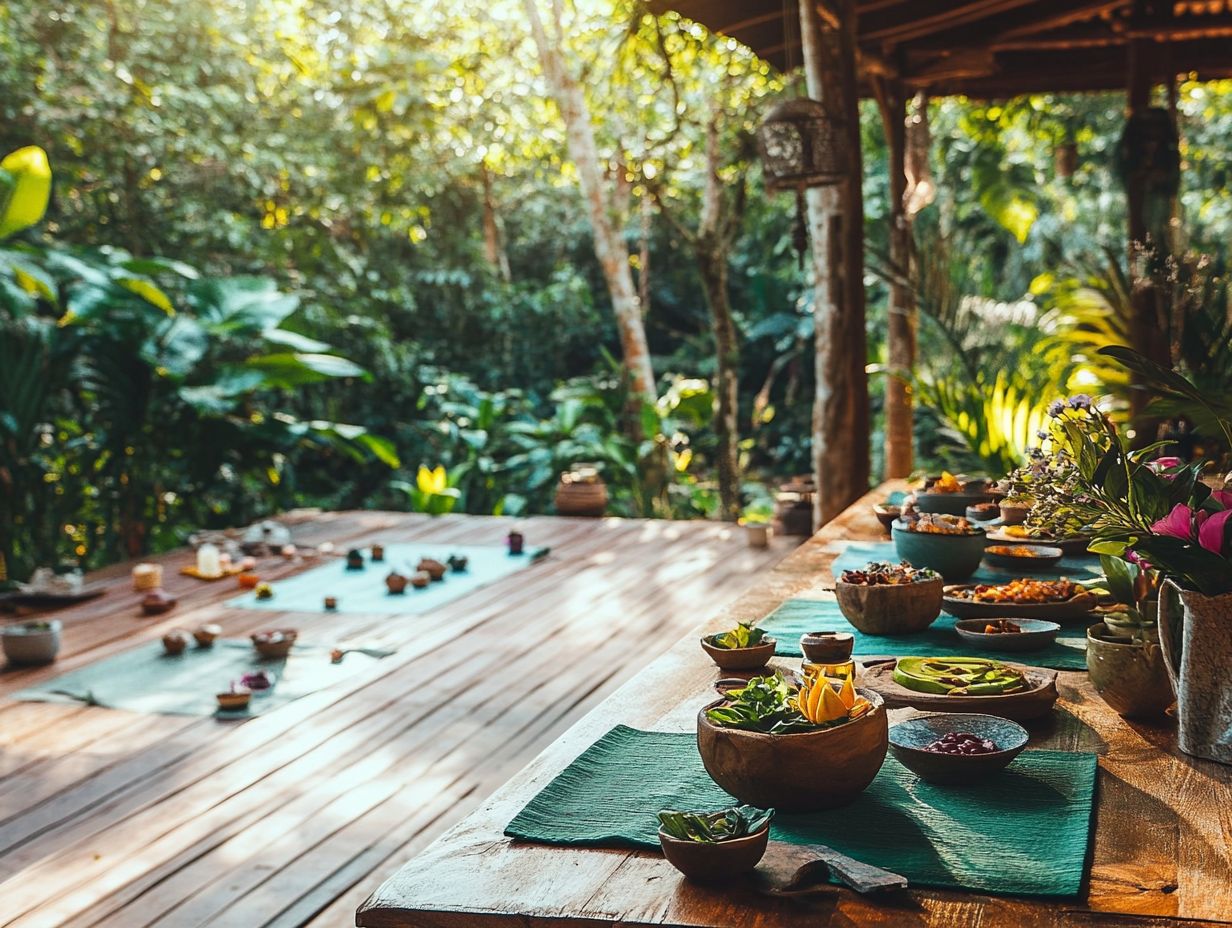
Ecotourism adventures in Costa Rica offer a sustainable way to explore the country’s breathtaking landscapes while fostering a deeper connection with nature and promoting a sustainable lifestyle. Popular destinations include Corcovado National Park, La Fortuna, and Puerto Jiménez, which provide a communal kitchen or accommodation for visitors.
Activities in ecotourism include hiking and community development programs that immerse travelers in the natural environment. Many ecotourism experiences are vegan-friendly, providing meals that cater to travelers’ dietary preferences.
Travelers can enjoy hiking trails in the Monteverde Cloud Forest, where they can encounter hundreds of plant and animal species. Other popular trails include those in:
- Manuel Antonio National Park, where sloths and vibrant birds can often be spotted,
- Cahuita National Park, known for its stunning Caribbean beaches and coral reefs.
Guided tours to organic coffee farms and tropical fruit plantations also allow visitors to sample delicious, sustainable, and locally sourced vegan dishes.
Ecotourism in Costa Rica underscores the importance of balancing exploration with environmental stewardship. As more travelers flock to the country, it is essential to ensure that its rich ecosystems are preserved for future generations.
How Does Veganism Promote Wellness in Costa Rica?
Veganism promotes wellness in Costa Rica by encouraging a lifestyle centered on well-being through a healthy diet rich in plant-based foods and sustainable practices.
Emphasizing the consumption of locally sourced, organic produce benefits both individual health and environmental sustainability.
Additionally, wellness experiences such as yoga, meditation, and nutritious eating enable individuals to find a balance between physical well-being and mental clarity.
1. Improved Physical Health
A vegan diet can offer significant benefits for physical health, as it is typically rich in essential nutrients, vitamins, and minerals.
Research indicates that individuals who adopt a vegan lifestyle tend to have lower cholesterol levels, improved blood pressure, and a reduced risk of various chronic diseases. The focus on whole foods and natural ingredients is directly linked to increased energy levels and overall vitality.
Studies have shown that vegans enjoy a 25% lower risk of heart disease and are significantly less likely to develop type 2 diabetes compared to their meat-eating counterparts.
By opting for plant-based foods, they can easily boost their fiber intake, which promotes a healthy digestive system and aids in maintaining a healthy weight.
Additionally, the high levels of antioxidants found in fruits and vegetables support proper immune function and may help reduce the risk of certain cancers.
With careful planning, a vegan diet can provide all the macronutrients and micronutrients necessary for strong physical health.
2. Mental Clarity and Focus
Veganism can enhance mental clarity and focus, as the consumption of nutrient-dense plant-based foods supports cognitive function and emotional well-being. A diet rich in antioxidants, healthy fats, and vitamins can help reduce brain fog and improve concentration, enabling individuals to engage more fully in life.
Additionally, practices such as meditation and yoga, which often accompany wellness experiences in the vegan community, promote a mindful state that fosters mental wellness. Foods such as leafy greens, berries, nuts, and seeds are particularly beneficial, providing essential nutrients like omega-3 fatty acids and flavonoids that are vital for a healthy brain.
These components work together to support synaptic function, improve memory, and stabilize mood. Furthermore, including legumes and whole grains in meals offers a steady source of energy and helps prevent the energy dips associated with less nutrient-dense options.
3. Environmental Sustainability
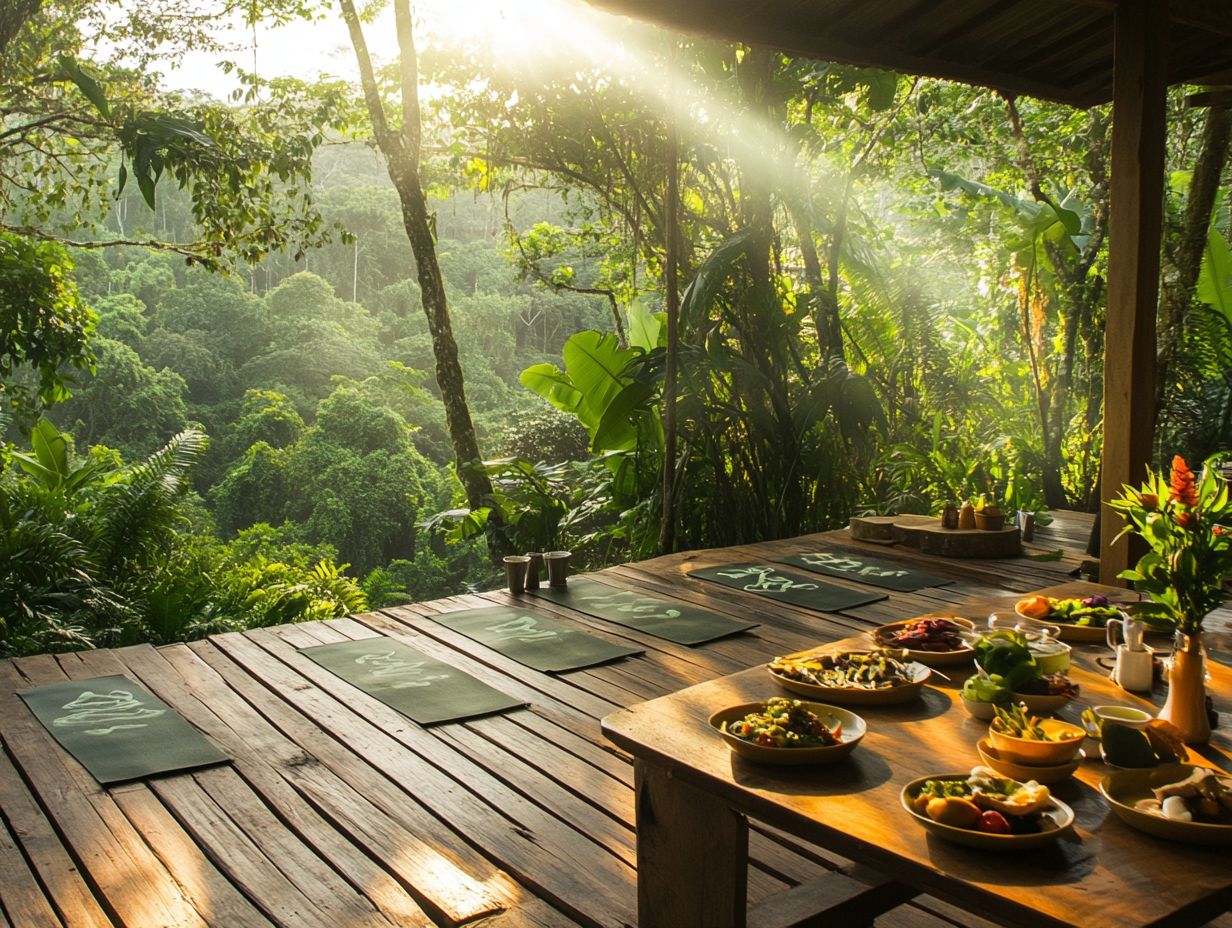
Veganism promotes sustainability by encouraging a diet that utilizes fewer natural resources and generates lower greenhouse gas emissions compared to traditional animal-based diets. By adopting a plant-based diet, individuals can significantly reduce their ecological footprint and contribute to a healthier planet.
The intersection of personal health and environmental health is a fundamental aspect of the vegan lifestyle, enhancing the overall well-being of both individuals and their communities. Transitioning to a vegan diet lessens the strain on over-exploited ecosystems and fosters biodiversity by mitigating habitat loss associated with livestock farming.
According to a 2016 study published in the Proceedings of the National Academy of Sciences of the United States of America by the University of Oxford, plant-based diets require less land and water. Such diets will become increasingly vital as the world faces challenges related to climate change, resource scarcity, and the anticipated doubling of food demand by 2050.
By embracing a vegan lifestyle, individuals can actively address significant environmental issues, including deforestation and pollution. This choice allows people to align their food selections with their personal ethics and recognize the connection between their choices and the health of the planet.
What Are Some Tips for Maintaining a Vegan Diet in Costa Rica?
Having a fulfilling and enjoyable vegan diet in Costa Rica is possible with an understanding of local resources and effective planning strategies. As the variety of vegan options in the country continues to grow, it is essential to become familiar with local cuisines and available ingredients to successfully navigate the challenges of maintaining a vegan diet.
With its emphasis on health and wellness, Costa Rica is well-suited to meet the needs of those committed to a vegan lifestyle.
1. Research Local Vegan Options
Researching local vegan options is essential for vegans in Costa Rica, as it enhances their experience and supports proper nutrition. The country’s rapidly growing vegan culture has made it easier for travelers to find restaurants and cafes that offer plant-based foods.
Many of these establishments prioritize organic and locally sourced ingredients, aligning their offerings with the health goals of their patrons. Enjoying local vegan dining not only benefits the community’s economy but also provides unique experiences that reflect the region’s diverse culture.
For instance, well-reviewed restaurants like Café Naranja in San Jose and the eco-friendly Pipe House in Playa Avellanas feature a wide selection of vegan dishes.
Additionally, platforms like HappyCow and local vegan Facebook groups are valuable resources for discovering hidden culinary gems.
2. Pack Snacks and Supplements
Packing snacks and supplements is a practical tip for maintaining a vegan diet while traveling in Costa Rica, especially in areas where vegan options may be limited. Having portable, plant-based snacks on hand can help individuals stay nourished and energized throughout their adventures.
Additionally, bringing essential supplements ensures that nutritional needs are met, particularly for those with specific dietary restrictions. For example, energy bars made with nuts and dried fruits are excellent choices, providing a quick boost during hikes or long drives.
- Trail mix, which is packed with seeds, nuts, and dark chocolate, not only satisfies sweet cravings but also offers a mix of healthy fats and protein.
- Including protein powder or vegan protein shakes in your travel bag can help maintain muscle energy and keep protein intake on track.
These thoughtful preparations contribute to a better travel experience, allowing travelers to explore the beautiful landscapes of Costa Rica without worrying about nutritional deficits.
3. Communicate with Restaurant Staff
Effective communication with restaurant staff is essential for maintaining a vegan diet while dining out in Costa Rica. Clearly expressing dietary needs allows staff to recommend suitable menu items and modify dishes accordingly.
Most restaurants are eager to accommodate vegan requests, especially as the popularity of plant-based diets continues to grow, leading to more satisfying meals that promote overall health and wellness.
Learning a few key phrases in Spanish to articulate dietary requirements can enhance interactions with restaurant personnel. For example, stating “Soy vegano/a” (I am vegan) or “No como productos animales” (I do not eat animal products) can be very helpful.
Politeness is also important; expressing gratitude by saying “Gracias por su ayuda” (Thank you for your help) fosters a friendly dialogue.
Being clear about your preferences is crucial, so taking the time to specify any additional restrictions beyond veganism, such as avoiding dairy or eggs, will help ensure a positive dining experience as you explore the rich culinary traditions of Costa Rica.





